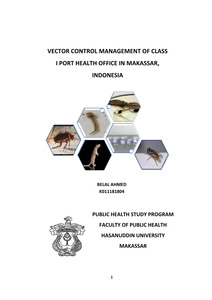Ahmed, Belal (2024) MANAJEMEN PENGENDALIAN VEKTOR KANTOR KESEHATAN PELABUHAN KELAS I MAKASSAR INDONESIA. Skripsi thesis, Universitas Hasanuddin.
![[thumbnail of Cover]](/37311/1.hassmallThumbnailVersion/K011181804_skripsi_05-07-2024%20cover1.png)

K011181804_skripsi_05-07-2024 cover1.png
Download (305kB) | Preview
K011181804_skripsi_05-07-2024 1-2.pdf
Download (676kB)
K011181804_skripsi_05-07-2024 dp.pdf
Download (567kB)
K011181804_skripsi_05-07-2024.pdf
Restricted to Repository staff only until 1 January 2026.
Download (1MB)
Abstract (Abstrak)
Background: Vector control has been the power against vector-borne diseases. Controlling vector-borne diseases across international borders is a crucial public health issue. Port health office which is known as KKP in Indonesia carries out its duty in the working area of seaport and airport. Purpose: This paper describes the last 5 years of data which was collected from the KKP and wanted to know how these vectors were managed during those years. Method: The type of research used is quantitative descriptive. The descriptive method used in this research is to serve the purpose of the research. The purpose of this research is to obtain information related to the management of vectors at Sultan Hasanuddin international Airport, Makassar and Port of Soekarno-Hatta, Makassar. Results: The field of Environmental Risk Control is a field that focuses on environmental sanitation at the Makassar port health office. Fly and Mosquito vector is mainly controlled through spraying insecticides. On the other hand, rat and cockroach vectors are controlled by using traps and further examinations. For mosquitoes it is noticed that in the month from March to May the house index has increased. One of the reasons for this trend can be explained as these months are the rainy season in Makassar. Rats vectors in a port setting suggest poor maintenance, including unclean and damp conditions, limited food, and poor management of environmental cleanliness. Flies vector results indicate a relationship between use of insecticide and fly density level. When the fly density levels were high both in port and airport, higher levels of insecticide were used. From mid-2021, the level of Cockroach life survey in port was increasing but from March 2022 the level was 0 again. On the other hand, in the airport the Cockroach life survey was continuously increasing from April 2022. Due to the increase in surveys this trend can be observed. Study limitation: For the mosquito vector data was not found in the airport 2018 and 2019 and Data related vector control was also not found. This paper is limited to describing the vector control management of Makassar port health office. Conclusion: Although vector control programs were fulfilled by the port health office, there is still room for improvement as most of the vectors are still present and in some cases vector density is still high.
| Item Type: | Thesis (Skripsi) |
|---|---|
| Uncontrolled Keywords: | Management, Airport, Port, Vector control |
| Subjects: | R Medicine > RA Public aspects of medicine > RA0421 Public health. Hygiene. Preventive Medicine |
| Divisions (Program Studi): | Fakultas Kesehatan Masyarakat > Kesehatan Masyarakat |
| Depositing User: | S.I.P Zohrah Djohan |
| Date Deposited: | 10 Sep 2024 23:53 |
| Last Modified: | 10 Sep 2024 23:53 |
| URI: | http://repository.unhas.ac.id:443/id/eprint/37311 |


